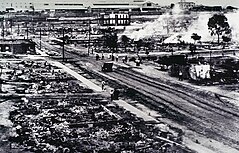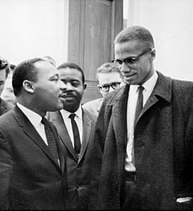
Back تاريخ الأمريكيين الأفارقة Arabic Geschichte der Afroamerikaner German Histoire des Afro-Américains French Storia afroamericana Italian 아프리카계 미국인의 역사 Korean Historia Afroamericanorum Latin Afroamerikansk historie NB Afroamerikansk historia Swedish 非裔美國人歷史 Chinese
This article needs additional citations for verification. (April 2023) |
| This article is part of a series on the |
| History of the United States |
|---|
 |
| Part of a series on |
| African Americans |
|---|
| Part of a series on |
| Slavery |
|---|
 |
African-American history started with the arrival of Africans to North America in the 16th and 17th centuries. Former Spanish slaves who had been freed by Francis Drake arrived aboard the Golden Hind at New Albion in California in 1579.[1] The European colonization of the Americas, and the resulting Atlantic slave trade, led to a large-scale transportation of enslaved Africans across the Atlantic; of the roughly 10–12 million Africans who were sold by the Barbary slave trade, either to European slavery or to servitude in the Americas, approximately 388,000 landed in North America.[2][3] After arriving in various European colonies in North America, the enslaved Africans were sold to white colonists, primarily to work on cash crop plantations. A group of enslaved Africans arrived in the English Virginia Colony in 1619, marking the beginning of slavery in the colonial history of the United States; by 1776, roughly 20% of the British North American population was of African descent, both free and enslaved.[4][5]
The American Revolutionary War, which saw the Thirteen Colonies become independent and transform into the United States, led to great social upheavals for African Americans; Black soldiers fought on both the British and the American sides, and after the conflict ended the Northern United States gradually abolished slavery.[6][7] However, the American South, which had an economy dependent on plantations operation by slave labor, entrenched the slave system and expanded it during the westward expansion of the United States.[8][9] During this period, numerous enslaved African Americans escaped into free states and Canada via the Underground Railroad.[10] Disputes over slavery between the Northern and Southern states led to the American Civil War, in which 178,000 African Americans served on the Union side. During the war, President Abraham Lincoln issued the Thirteenth Amendment, which abolished slavery in the U.S., except as punishment for a crime.[11]
After the war ended with a Confederate defeat, the Reconstruction era began, in which African Americans living in the South were granted equal rights with their white neighbors. White opposition to these advancements led to most African Americans living in the South to be disfranchised, and a system of racial segregation known as the Jim Crow laws was passed in the Southern states.[12] Beginning in the early 20th century, in response to poor economic conditions, segregation and lynchings, over 6 million primarily rural African Americans migrated out of the South to other regions of the United States in search of opportunity.[13] The nadir of American race relations led to civil rights efforts to overturn discrimination and racism against African Americans.[14] In 1954, these efforts coalesced into a broad unified movement led by civil rights activists such as Rosa Parks and Martin Luther King Jr. This succeeded in persuading the federal government to pass the Civil Rights Act of 1964, which outlawed racial discrimination.[15]
The 2020 United States census reported that 46,936,733 respondents identified as African Americans, forming roughly 14.2% of the American population.[16] Of those, over 2.1 million immigrated to the United States as citizens of modern African states.[17] African Americans have made major contributions to the culture of the United States, including literature, cinema and music.[18]
- ^ Kauffman, Miranda (2018). Black Tudors" The Untold Story. Oneworld Publications.
- ^ Gates, Henry Louis (2014). "How Many Slaves Landed in the US?". The Root. Retrieved July 8, 2018.
Incredibly, most of the 42 million members of the African-American community descend from this tiny group of less than half a million Africans.
- ^ "America's Black Holocaust Museum | How Many Africans Were Really Taken to the U.S During the Slave Trade?". abhmuseum.org. 6 January 2014. Retrieved 2018-09-05.
- ^ Schneider, Dorothy; Schneider, Carl J. (2007). Slavery in America. Infobase Publishing. p. 554. ISBN 978-1438108131.
- ^ Kolchin, Peter (2003). American Slavery, 1619–1877 (2nd ed.). New York: Hill and Wang. ISBN 978-0809016303.
- ^ Bibko, Julia (2016). "The American Revolution and the Black Loyalist Exodus". History: A Journal of Student Research. 1 (1).
- ^ Foner, Eric (2010). The Fiery Trial: Abraham Lincoln and American Slavery. New York: W. W. Norton & Company, Inc. p. 14. ISBN 978-0195137552.
- ^ William J. Cooper, Jr. and Thomas E. Terrill (2008). The American South: A History. Rowman & Littlefield. p. 363. ISBN 9780742563995.
- ^ Leonard L. Richards, Slave Power: The Free North and Southern Domination, 1780–1860 (2000) p. 3)
- ^ Bordewich, Fergus M. (2005). Bound for Canaan: The Underground Railroad and the War for the Soul of America. Harper Collins. ISBN 0060524308.
- ^ McPherson, James M. (1988). Battle Cry of Freedom: The Civil War Era. Oxford, New York: Oxford University Press. ISBN 978-0195038637.
- ^ Fremon, David (2000). The Jim Crow Laws and Racism in American History. Enslow. ISBN 0766012972.
- ^ Lemann, Nicholas (1991). The Promised Land: The Great Black Migration and How It Changed America. Vintage Press. ISBN 0679733477.
- ^ Finkelman, Paul. ed. 2009. Encyclopedia of African American History, 1896 to the Present (5 vol.). Oxford University Press. ASIN 0195167791.
- ^ Ellis, Sylvia. Freedom's Pragmatist: Lyndon Johnson and Civil Rights (U Press of Florida, 2013).
- ^ "2020 Census Illuminates Racial and Ethnic Composition of the Country".
- ^ Solomon, Salem (February 17, 2017). "African Immigrant Population on Rise in US". Voice of America. Retrieved 26 February 2017.
- ^ "African Americans - A new direction | Britannica".
© MMXXIII Rich X Search. We shall prevail. All rights reserved. Rich X Search







